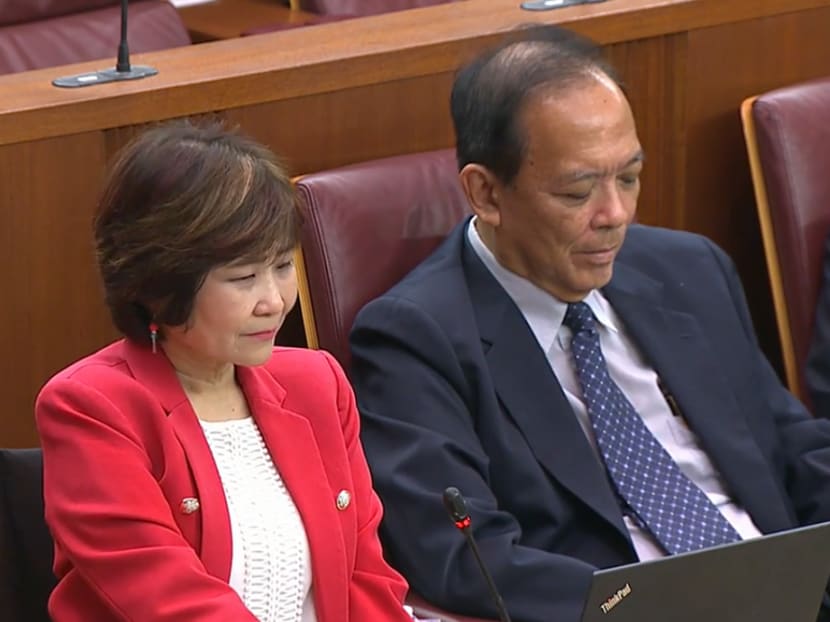MPs call for integration of special-needs and mainstream students
SINGAPORE — Choking back tears, Nominated Member of Parliament (MP) Chia Yong Yong on Wednesday (July 11) related how there were times she felt like a burden and nuisance to her teachers and classmates due to her physical disability. But being able to stay in a mainstream school and be treated like any other child – complete with the same punishments she got for talking too much in class or failing to do her homework – was what completed her, said the lawyer who studied at Paya Lebar Methodist Girls’ School for 10 years.

NMP Chia Yong Yong choked back tears as she spoke in parliament during the motion on the future of Singapore’s education system. She was driving home the point that children with disabilities or special needs should get a chance to participate effectively as members of society.
SINGAPORE — Choking back tears, Nominated Member of Parliament (MP) Chia Yong Yong on Wednesday (July 11) related how there were times she felt like a burden and nuisance to her teachers and classmates due to her physical disability.
But being able to stay in a mainstream school and be treated like any other child – complete with the same punishments she got for talking too much in class or failing to do her homework – was what completed her, said the lawyer who studied at Paya Lebar Methodist Girls’ School for 10 years.
“(I had many teachers who) did not treat me as inferior to a child without disability. They accommodated my disability, but they treated me the same… I was like any other child,” said Ms Chia, who is wheelchair-bound from peroneal muscular atrophy. “And I want to say that the mainstream education that I went through is what I think is an opportunity we should give to every child.”
Speaking during the motion on the future of Singapore’s education system in Parliament, Ms Chia was driving home the point that special education schools and mainstream schools should be encouraged to work together to allow children with disabilities or special needs a chance to “develop their potential, thrive in the same environment as their peers… and participate effectively as members of our society”.
Her suggestions include the co-location of special education schools with mainstream schools, and having the co-located students wear the same uniform to foster a “common identity”.
The curriculum of both schools could also be based on the national curriculum, and be modified according to “the ability or disabilities of the child”, she added.
MP for Jurong Group Representative Constituency Rahayu Mahzam – who is mother to a child with Down syndrome – echoed the same view.
She once heard the caller to a radio talk show saying the parents of children with special needs are in denial when they insist their children be placed in mainstream schools.
Ms Rahayu said she “cried her eyes out that afternoon” as it “felt like a rejection”.
Calling for the education system to fit children of all abilities, she said research has shown that children with special needs show greater speech and language development when they are supported to communicate with their peers.
“If there is segregation and the children are not treated equally within the same setting, that’s not truly inclusive education,” she added.
An inclusive education is one where all children learn and play within the same setting “but in different pathways”. They receive support and assistance based on their needs but have the opportunity to interact meaningfully with others, she said.
The Government needs to set up a “proper support structure” along with an improved career pathway for special education teachers. It should offer a curriculum that caters to different needs, paces of learning as well as provide the facilities and resources required, said Ms Rahayu.
In response, Senior Parliamentary Secretary for Education Muhammad Faishal Ibrahim said the Education Ministry will take their suggestions seriously and study them further.
Embracing those of different abilities will take time and a sustained effort, he said.
“We need everyone to commit to this – teachers, schools, parents, the public, employers and the wider society,” he said. “Likewise, we have to teach our children with Special Educational Needs to be advocates for themselves. They must learn how to communicate their needs to friends, co-workers, and employers, and to be confident contributors to society.”
Not all students with special needs are comfortable in social settings and may require long-term support by specially-trained teachers to develop the skills needed, and Associate Professor Faishal said the current “hybrid approach” might still be more appropriate.
The current special education (Sped) school environment accommodates the needs of students, and when they are ready, provides the chance to interact with peers in other schools, such as through satellite partnerships with mainstream schools.
Satellite partnerships allow special-needs students who are deemed academically ready to join their mainstream peers for selected subjects. From four partnerships in 2008, the number grew to 16 in 2014, according to the Ministry of Social and Family Development’s website.
On whether Singapore has “got the balance right” between providing for special-needs students through Sped schools and the interaction opportunities granted through satellite partnerships, Assoc Prof Faishal said: “I think we have made progress, but we still have ways to go… I am confident such inclusion efforts will gain momentum.”











